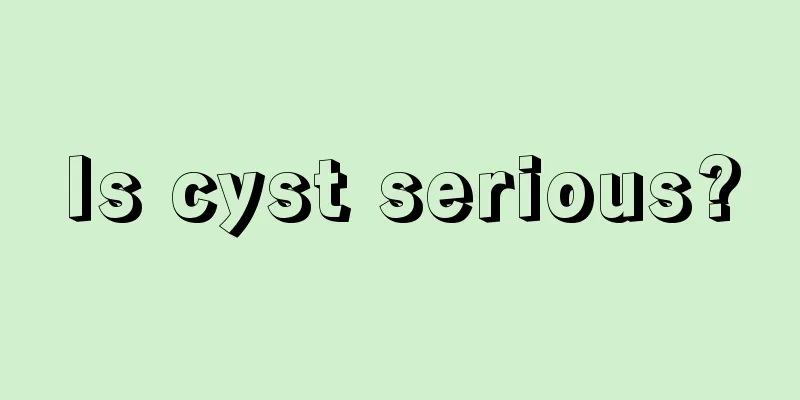Why does a cold cause nosebleeds

|
When people have a cold, they will have a high fever. At this time, they must replenish water in time to avoid severe dehydration due to fever. When you have a fever, your nasal cavity will become particularly dry, which can easily cause the capillaries in your nasal cavity to rupture. If conditions permit, when you have a cold, apply a wet towel to your nose to relieve the dryness in your nasal cavity. Why does a cold cause nosebleeds? A cold causes congestion in the nasal mucosa. Picking or blowing your nose often causes the congested mucosa to rupture, leading to nosebleeds. The main treatment is local symptomatic treatment. Plug your nose for a nosebleed If you have a nosebleed, immediately find some toilet paper and roll it into a ball the size of your nostril and plug it with it. Remember not to look up, but look straight ahead or lower your head slightly. Apply ice to your neck Immediately apply ice cubes, ice water or cold water to the back of the neck, mainly to reduce the temperature and accelerate the contraction of capillaries to accelerate bleeding. Sit back and rest for a while After treatment, remember not to walk around or exercise. Sit quietly for a while. The nosebleed will usually stop within 5 minutes, and then you can remove the paper ball blocking the nose. If the nosebleed fails to stop for a long time, please go to a professional hospital immediately. Apply medicine Many nosebleeds caused by colds are caused by dry nostrils. At this time, it is best to apply some "chlortetracycline hydrochloride ointment" every day to keep the nostrils moist, which can also effectively reduce the possibility of nosebleeds. Go to a specialized hospital for treatment If you have frequent nosebleeds or the bleeding is difficult to stop, please go to a professional hospital for treatment. I have frequent nosebleeds. After going to the hospital for examination, it was found that I had "mucosal erosion and vascular dilation in the bilateral K's zone of the nose", which caused capillaries to rupture and bleed easily when the weather was dry or when I rubbed my nose. It was finally solved through "electrocoagulation" in a professional hospital. Foods to avoid when you have a cold: High-fat, greasy foods During a cold, appetite will decrease. Eating greasy food will make your appetite worse, and you will not be able to absorb enough nutrients. Your immunity will be affected. Eating this kind of food when you have a cold can easily cause symptoms such as nausea. Strong tea, strong coffee Strong tea and strong coffee can cause gastrointestinal discomfort and sometimes may trigger gastroesophageal reflux. When there are symptoms of nasal congestion, it may even affect the nasal cavity and cause discomfort. Spicy Food Spicy foods such as chili peppers can make the fragile gastrointestinal function more disordered and even cause the risk of nausea and vomiting. Crude fiber food During a cold, people's gastric motility is weak, so during this period, you should try to avoid eating crude fiber foods such as celery, leeks, and Chinese cabbage, otherwise it will increase the burden on the gastrointestinal tract. High-salt foods Reducing salt intake can increase the lysozyme content in saliva, protect the epithelial cells of the oral and throat mucosa, and allow them to secrete more immunoglobulins and interferons to fight the cold virus. But you cannot do without salt when you have a cold, because the body will lose some sodium ions during the process of sweating, and the salt used in cooking is a supplement to sodium ions. During a cold, just limit your daily salt intake to 5 grams. Sweets Although eating sweet food may make your throat feel more comfortable when you have a cold, especially when you have a cough, high-sugar fruits and desserts should be avoided during a cold. Sweets not only increase the viscosity and amount of phlegm, but also cause abdominal bloating and suppress appetite. High-sugar fruits include mango, grapes, lychees, sugarcane, pineapples, red dates, etc. |
<<: What is the reason for recurrent nosebleeds
>>: The right thing to do when you have a nosebleed
Recommend
How to remove melanin pigmentation What to do with melanin pigmentation
When our skin has melanin deposition, we can appl...
Sympathetic nervous system excitement insomnia
Many people suffer from insomnia due to work pres...
If you love soaking your feet in the summer, you won’t get sick all year round, but how do you soak your feet scientifically?
Summer is here, and more and more people are wear...
Which hospital is good at treating melanoma
Which hospital is good at treating melanoma? I be...
Apply oil to your belly button to lose weight?
Nowadays, many people pay more and more attention...
What should patients with hemorrhoids eat after surgery
Although the risks of hemorrhoid surgery are rela...
How to remove stains from the wall
After living in a house for a long time, various ...
How can I wash moldy clothes
I believe that when it rains, our clothes will ne...
What are the early detection items for lymphoma
Lymphoma, this disease has many different manifes...
Laser acne scar recovery process
With the advancement of medical technology, there...
What are the effects of anti-fatigue eye masks
Modern people encounter many physical conditions ...
How to do postoperative care for lung cancer
Generally, the symptoms of early lung cancer pati...
The back of my head is itchy and there are large pieces of dandruff
Many people may have had this experience: when sc...
Can running prevent breast cancer?
Less exercise leads to a 24% increase in the recu...
Where will melanoma metastasize to?
Where does melanoma metastasize to? Melanoma can ...









